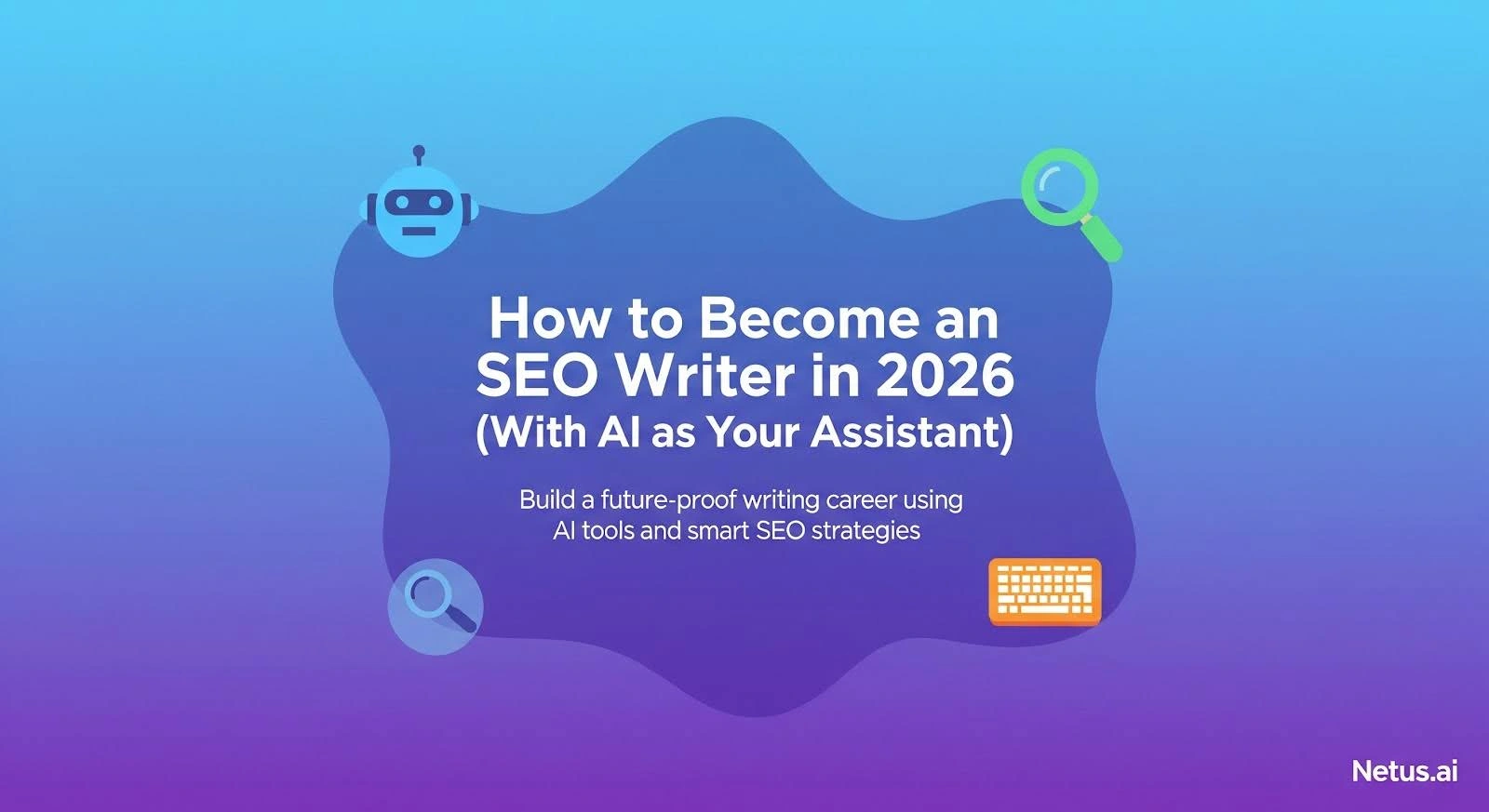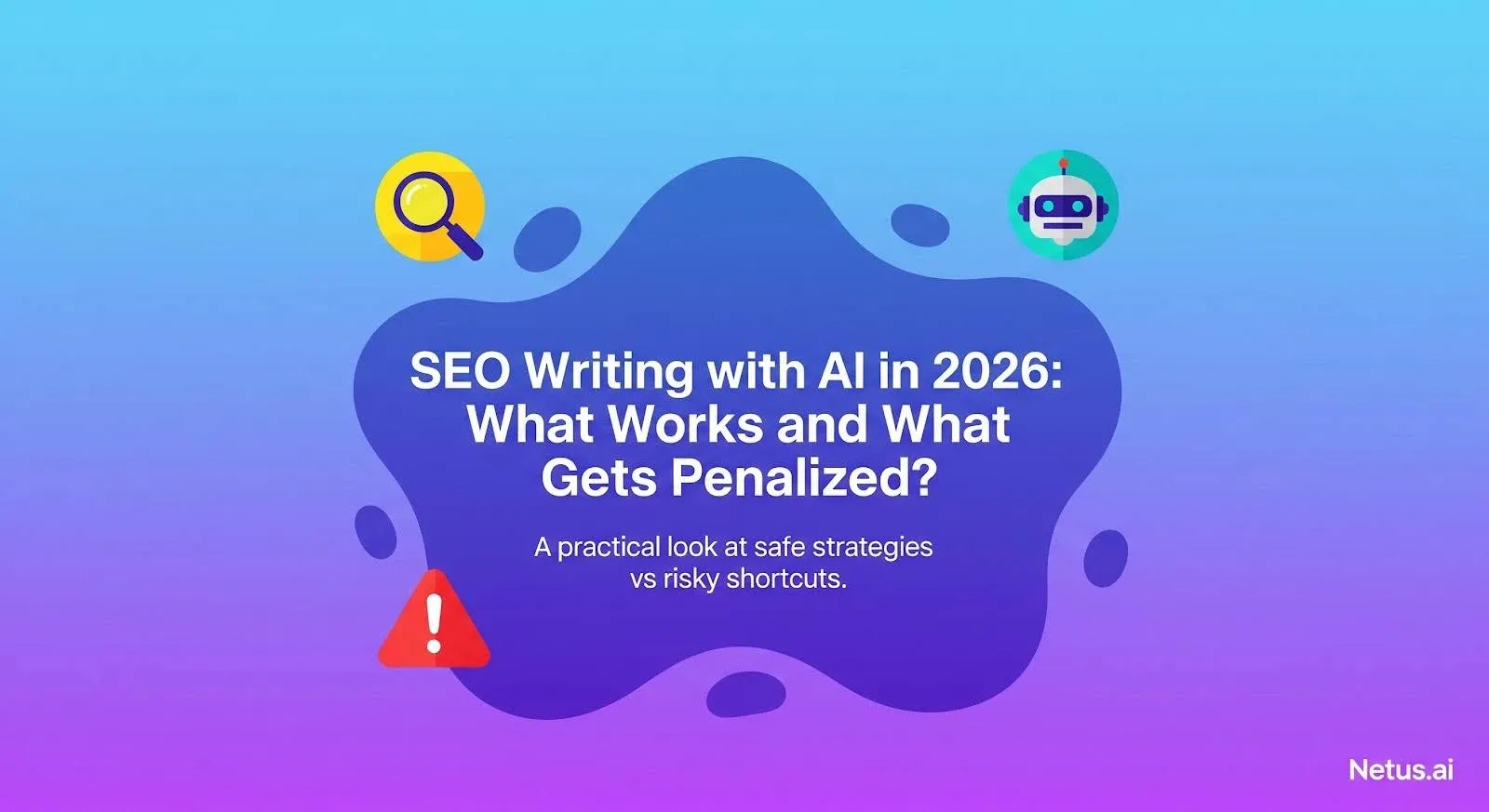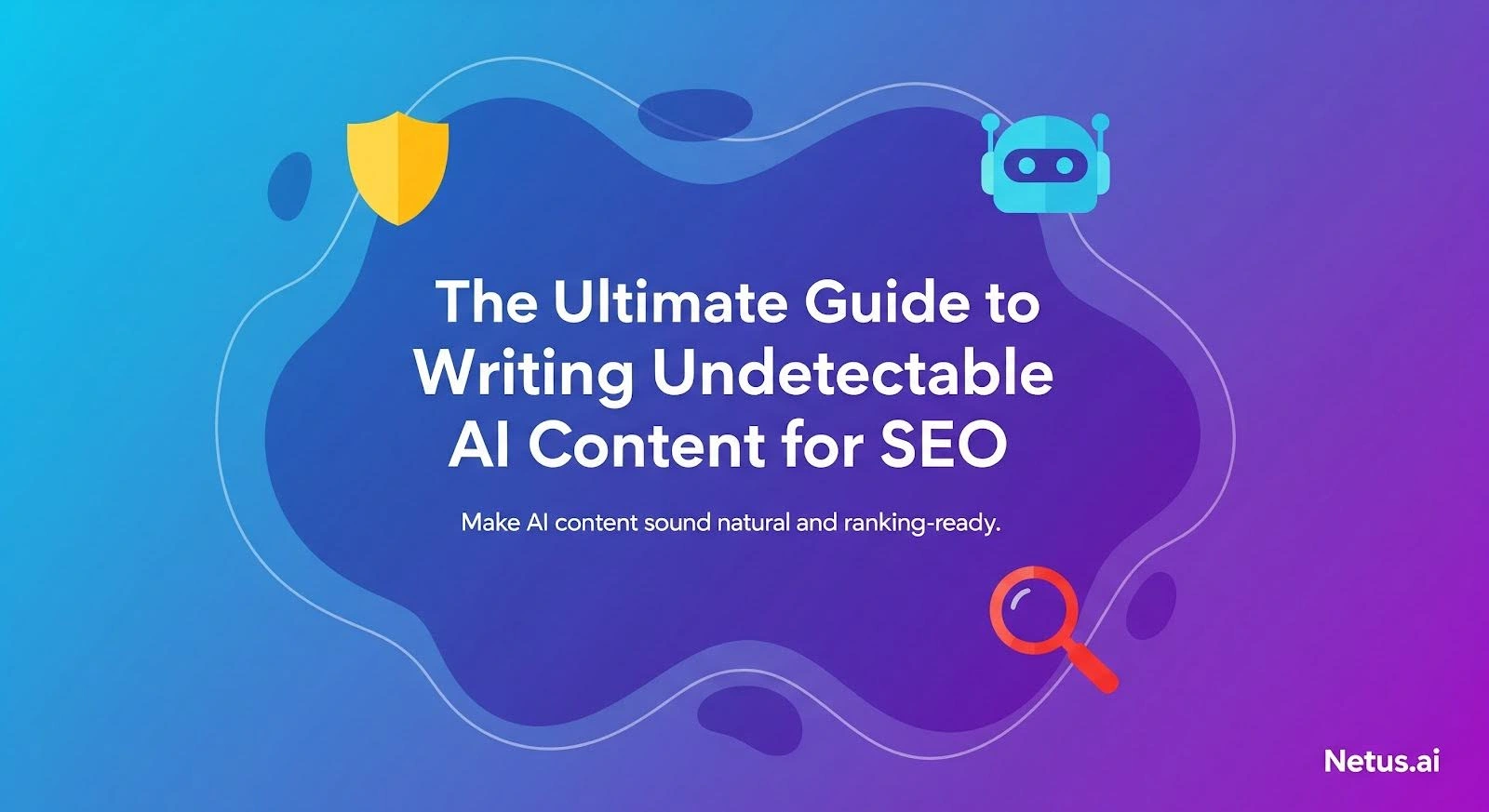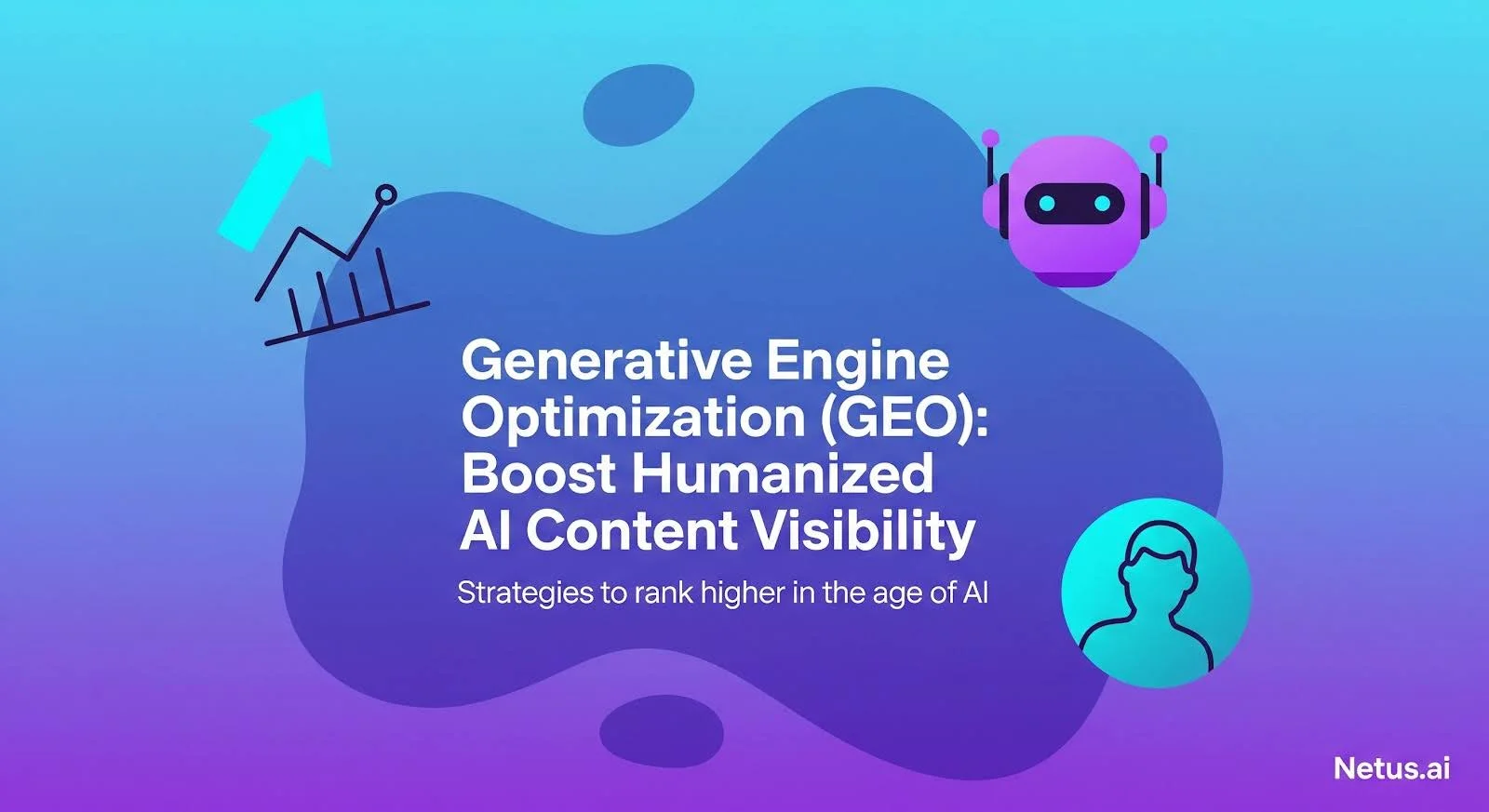Despite the speed and affordability of AI content generation, the demand for skilled SEO writers is actually higher in 2026. This is because, far from replacing strategy, AI has only intensified the necessity for it.
Google’s algorithms now ruthlessly prioritize E-E-A-T (Experience, Expertise, Authoritativeness, Trust) and genuine user value, elements deeply rooted in human insight, creativity and strategic thinking.
Businesses still need writers for:
- Unique expertise and brand voice.
- Content strategy (user intent/goals).
- Transforming AI drafts into authoritative, engaging and trustworthy content.
- Navigating advanced SEO complexities.
Learning to be an SEO writer in 2026 isn’t about fighting AI; it’s about mastering the irreplaceable skills that make content rank and convert in the AI era. It’s a future-proof, high-value skill set commanding premium rates.
Why SEO writing isn’t just surviving, it’s thriving in the AI age?

Demand for high-quality, ranking content is high. Businesses need to be found and convert in the digital noise.
- AI is a tool, not a replacement: Yes, AI writing assistants are ubiquitous. They’re fantastic for generating ideas, overcoming blank-page syndrome, drafting basic structures and speeding up research.
- AI content lacks: nuanced audience understanding, genuine expertise (EEAT), strategic intent, consistent brand voice, emotional intelligence and unique insights.
- Google’s getting smarter (and more demanding): Search engines, led by Google, are increasingly sophisticated. They’re not just matching keywords; they’re evaluating user experience, depth of expertise, trustworthiness and how well content genuinely satisfies the searcher’s intent. Google prioritizes helpful, reliable, people-first content. AI-generated content needs human expertise to meet these standards.
SEO writers in 2026 focus on strategy, user emotion and problem-solving, moving past just writing. AI handles data; humans interpret nuance.
Despite AI’s ability to generate basic text, human SEO writers are vital for strategy and nuance. Humans build trust and authority (EEAT) through genuine expertise, credible sourcing and real-world understanding. They also infuse brand voice for authentic, non-generic content.
Crucially, human writers provide the strategic oversight to ensure content aligns with the user journey, business goals and the broader marketing ecosystem.
What does an SEO writer actually do?
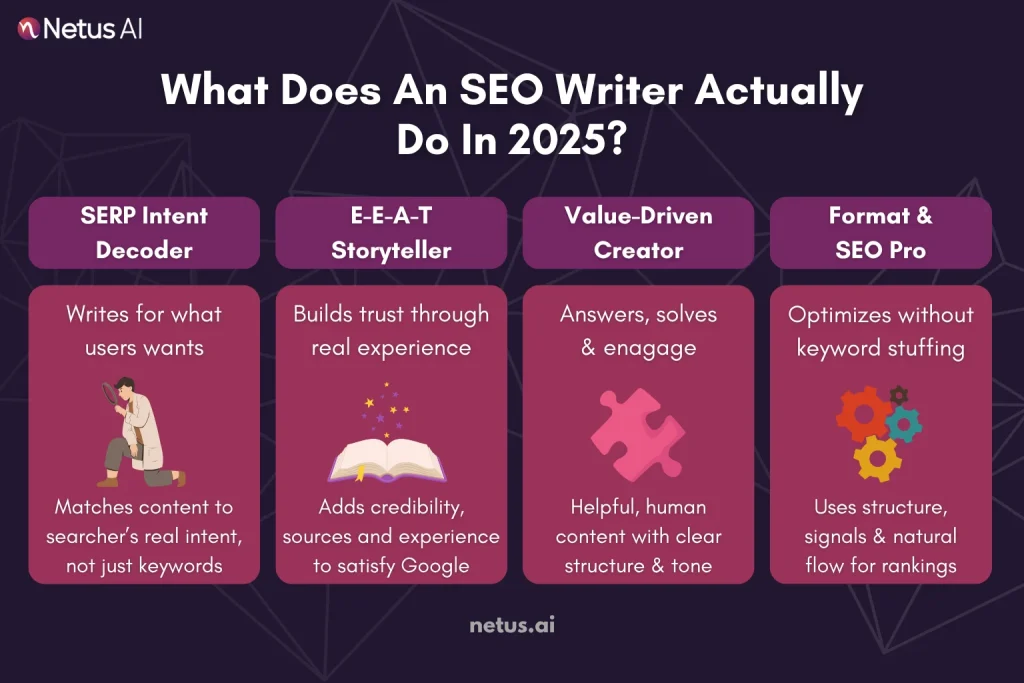
Gone are the days of simply sprinkling a target keyword 15 times into 500 words of mediocre text. The role of the SEO writer is multifaceted, strategic and deeply focused on delivering genuine value. Here’s the real breakdown:
- SERP intent whisperer: The SERP Intent Whisperer idea points out that SEO writing really starts with solid research. You do not jump straight into drafting. Instead, you kick things off by digging into SERP analysis. That means reviewing the top ranking content, checking out the People Also Ask sections and spotting any clear gaps in coverage.
Next, you work out the main user intent behind searches. It tends to fall into categories like informational, commercial, navigational or transactional. From there, you build your content to match that intent closely. At the same time, it has to stand out as better than what competitors offer.
- EEAT champion: SEO content really needs to line up with Google’s E-E-A-T guidelines. Those cover Experience, which means drawing on real-world knowledge. Then there’s Expertise, so you provide accurate and deep insights with clear explanations.
Authoritativeness shows up through solid backlinks and proper citations. Trustworthiness involves keeping things accurate, being transparent, using secure HTTPS setups and staying honest overall.
- Value-first content strategist & creator: In 2026, top-notch SEO content really has to focus on being deeply helpful. It needs to deliver full-on solutions that people can actually use right away.
On top of that, the SEO content has to pull readers in and keep things easy to follow. Think about chatting naturally, laying out a clear setup with headings and short chunks of text, maybe some images too. Stories work well here to break down tough concepts without making anyone strain.
- Technical formatting guru: Getting the structure of your content right really matters for users and for search engines too. You need to organize things logically with headings that grab attention and include keywords, like strong H1s and H2s. Then add in H3s and H4s to dive into more details.
To make it easier to scan, throw in bullet points and numbered lists along with tables that show relevant data. Using bold or italic text for emphasis helps a lot but you have to avoid stuffing in too many keywords. Writing meta descriptions that are short and tempting to click on is pretty much essential for solid SEO content too.
How AI has reshaped (not replaced) the SEO writer’s role: the human-AI collaboration?
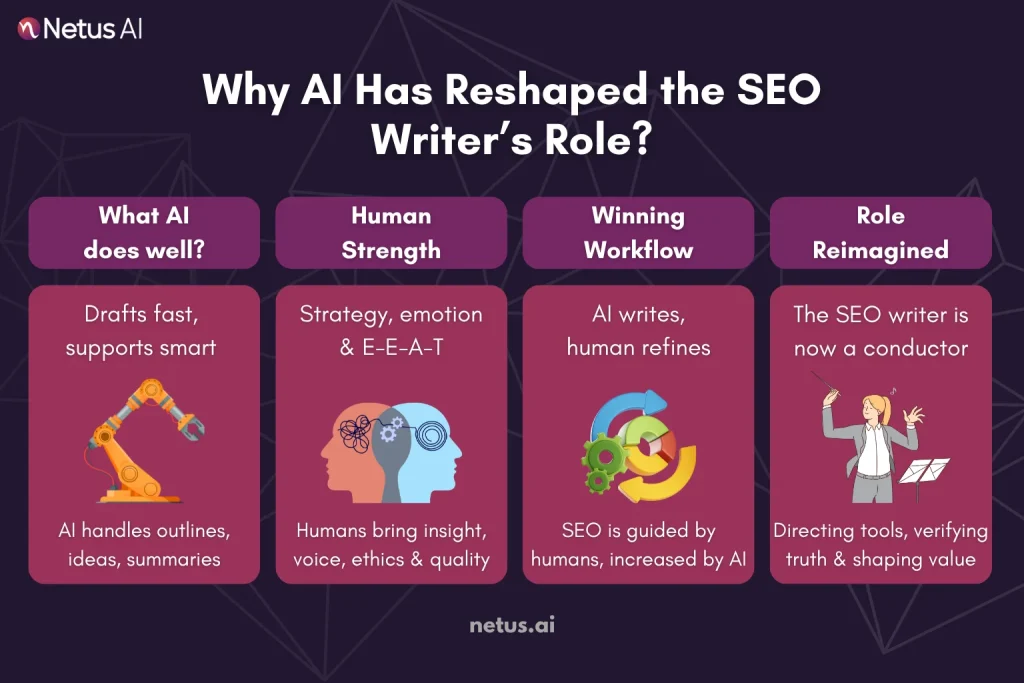
Let’s stop with the “AI vs. Human” narrative. The most effective SEO content writing happens through collaboration. AI tools are powerful assistants that augment human capabilities, freeing writers to focus on their unique strengths. Here’s how the workflow is evolving:
-
What AI handles well (the heavy lifting)?
AI tools significantly assist SEO writers by streamlining content creation. They help with brainstorming (topics, titles, FAQs), research summarization (requiring human fact-checking), drafting/outlining, overcoming writer’s block, basic optimization (keywords, headlines) and content repurposing.
-
What human writers must bring to the table (the irreplaceable value)?
The human role in SEO writing, amplified by AI, remains critical, focusing on core responsibilities: setting strategy (prompt engineering), rigorous fact-checking, injecting unique expertise (high EEAT), cultivating brand voice, applying nuance/empathy, critical editing for engagement and ensuring final technical optimization and ethical oversight (preventing bias/ensuring truth).
Content starts at generation: NetusAI’s SEO article writer and content generator
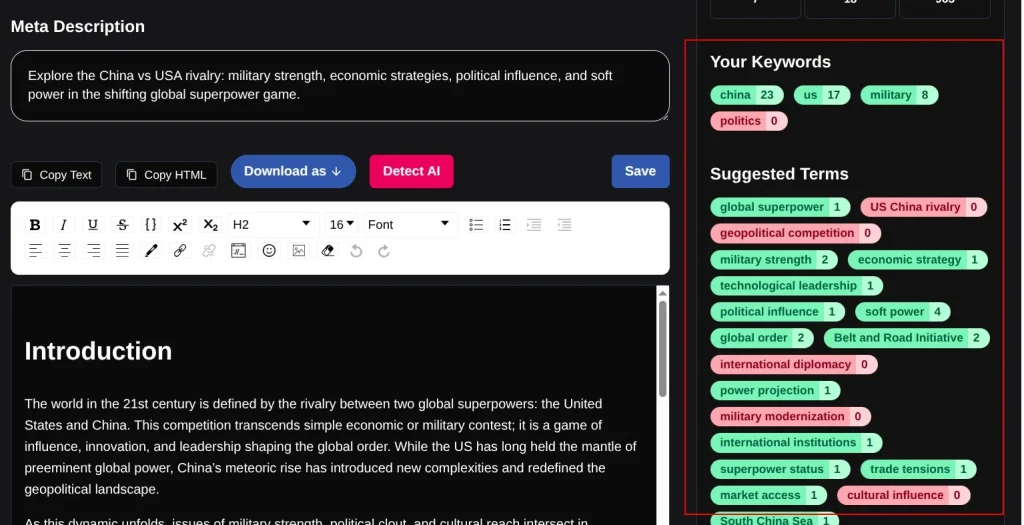
Avoiding stylometry and detection issues shouldn’t begin after content is written, it should start with the writing itself. That’s where NetusAI steps in.
Unlike generic AI tools that churn out robotic, easily flagged paragraphs, The NetusAI SEO Article Generator is designed to help you create full-length blog posts that are already optimized for clarity, tone and search intent. Unlike generic tools, it goes beyond simple drafting. It:
- Lets you input headlines and targeted SEO keywords
- Supports long-form templates for full blogs
- Auto-generates a structure with Title → Outline → Content
- Works in multiple languages for global teams
And most importantly: it ties directly into the Netus AI Bypasser + Detector system, meaning your output isn’t just readable, it’s already tuned to avoid detection.
You can generate, review and rewrite all in one interface without needing third-party tools to patch the gaps. It’s built for marketers, freelancers and bloggers who want their AI content to actually pass as human-written.
Final thoughts
SEO writing combines AI and human skill to create useful, credible, people-first content. While AI aids brainstorming, outlining and drafting, your strategic thinking, empathy and clear, purposeful writing are indispensable.
If you’re using tools like NetusAI: Start at generation. Don’t wait until after the draft to fix tone, structure and detection issues. With NetusAI’s integrated SEO article writer + bypasser engine, you can create long-form blog posts that rank and read, like human-written content from the start.
FAQs
What skills do I need to become an SEO writer in 2026?
Requires research, search intent knowledge, keyword optimization and AI tool (like Netus.ai) for faster drafting/rewriting/humanizing.
Can AI actually help me become a better SEO writer?
AI tools help with ideation, research, structuring and eliminating repetition. Platforms like Netus.ai can humanize AI drafts to pass detection.
Do I need to know coding or web development?
No. SEO writers focus on content, not coding.
How do I avoid sounding robotic if I use AI for writing?
Manually edit every AI draft. Add personal insights, vary sentences and humanize the content (e.g., using Netus.ai) before publishing.
Should I use AI for everything or combine it with human editing?
Use AI for speed but use detection-safe rewrites and human edits.

